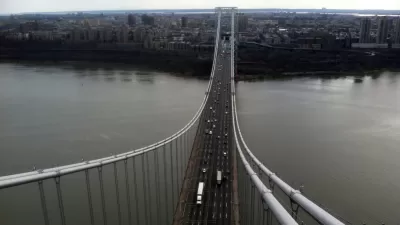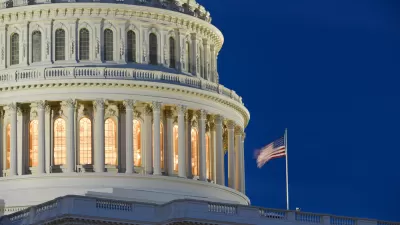While Congress debates its bipartisan infrastructure deal, a House-approved bill, the INVEST in America Act, waits in the wings with the potential to alter the direction of transportation planning in the United States.

"House Democrats are trying to use a massive climate and infrastructure bill to change how Americans get around — by breaking states’ decades-old fondness for building highways," writes Sam Mintz to sum up the stakes in the ongoing negotiations in Congress to finalize a bipartisan infrastructure bill.
Mintz is focusing on legislation approved in July by the House of Representatives—specifically, the $500 million INVEST in America Act (or federal transportation reauthorization) included in the larger "Moving Forward Act" infrastructure bill. According to Mintz, the INVEST in America Act has the potential to significantly shift infrastructure planning and funding in the United States, "baking climate policies into transportation." (The transportation sector is the largest source of greenhouse gas emissions in the United States.) The various layers of spending bills approved by the House also represent components of the American Jobs Plan proposed by the Biden administration in March with similar ambitions for changing the course of America's car-centric infrastructure tradition.
According to Mintz, the "INVEST in America Act" has encountered opposition from "state transportation departments and the road-building lobby." The U.S. Senate is working on a compromise, the Bipartisan Infrastructure Framework, that responds to some of those interests and could eventually influence the fate of the bill. Negotiations on Capitol Hill this week are reportedly not promising for the climate-friendly potential of the bill.
The purpose of Mintz's article is not to untangle the intricacies of Congressional lawmaking, but to reveal the history and consequences of the car-centric focus of U.S. transportation infrastructure planning and spending. "States have tended to use one primary strategy to tackle congestion: adding new highways or expanding existing ones," writes Mintz.
The aggregate evidence is staggering when considered in context of the scant signs of congestion relief and the encroaching realities of climate change: "From 1993 to 2017, states laid down 30,511 new miles of freeway lanes in the hundred largest urbanized areas — a 42 percent increase in highway capacity."
The INVEST in America Act would out a stop to the highway building proclivity by setting limits on the use of the National Highway Performance Program, asking states to "consider whether an 'operational improvement or transit project' would be more cost-effective than expanding capacity for single-occupancy vehicles," reports Mintz.
FULL STORY: Democrats look to crush states’ highway habit

Maui's Vacation Rental Debate Turns Ugly
Verbal attacks, misinformation campaigns and fistfights plague a high-stakes debate to convert thousands of vacation rentals into long-term housing.

Planetizen Federal Action Tracker
A weekly monitor of how Trump’s orders and actions are impacting planners and planning in America.

San Francisco Suspends Traffic Calming Amidst Record Deaths
Citing “a challenging fiscal landscape,” the city will cease the program on the heels of 42 traffic deaths, including 24 pedestrians.

Defunct Pittsburgh Power Plant to Become Residential Tower
A decommissioned steam heat plant will be redeveloped into almost 100 affordable housing units.

Trump Prompts Restructuring of Transportation Research Board in “Unprecedented Overreach”
The TRB has eliminated more than half of its committees including those focused on climate, equity, and cities.

Amtrak Rolls Out New Orleans to Alabama “Mardi Gras” Train
The new service will operate morning and evening departures between Mobile and New Orleans.
Urban Design for Planners 1: Software Tools
This six-course series explores essential urban design concepts using open source software and equips planners with the tools they need to participate fully in the urban design process.
Planning for Universal Design
Learn the tools for implementing Universal Design in planning regulations.
Heyer Gruel & Associates PA
JM Goldson LLC
Custer County Colorado
City of Camden Redevelopment Agency
City of Astoria
Transportation Research & Education Center (TREC) at Portland State University
Jefferson Parish Government
Camden Redevelopment Agency
City of Claremont





























